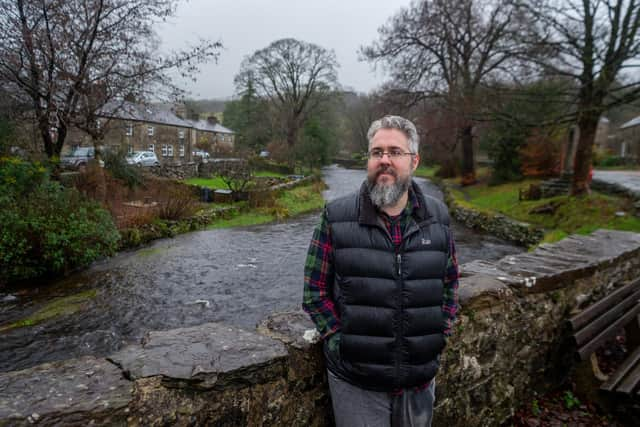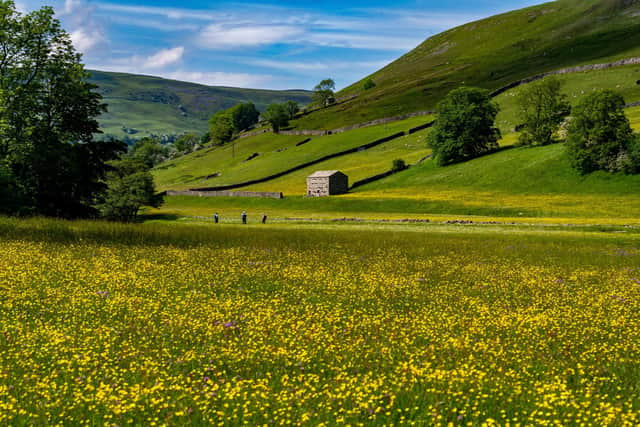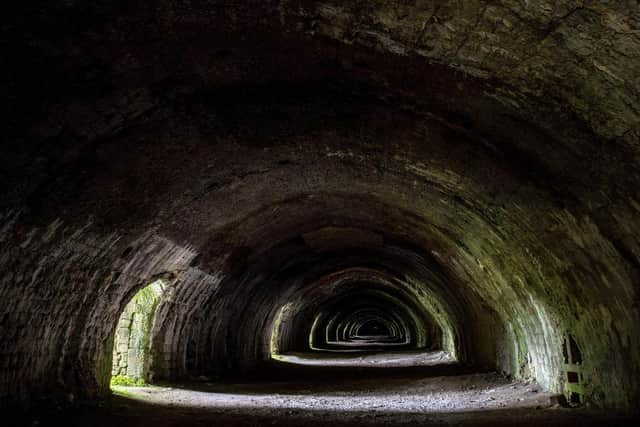New book explores some of the lesser known corners of the Yorkshire Dales
“It was with my dad in his red A-reg Ford Escort. I was only about eight or nine listening to Queen on the tape deck. Even now, whenever I hear Queen, especially their older songs, it just reminds me of those trips up the M6 in this knackered old Escort,” he says.
Mike grew up in St Helens, where his father worked, and his dad’s passion for the Dales rubbed off on him. “We’d either go and do a bit of cave spotting, or we might climb Pen-y-ghent, and we spent a lot of time by the river in Dent. All the love I have of the Dales has stemmed from my dad.
Advertisement
Hide AdAdvertisement
Hide Ad“I work in the Dales now and I wouldn’t be doing that were it not for his influence when I was young.”


Today, Mike is an author and also works for Yorkshire Dales Millennium Trust, and his new book – Secret Yorkshire Dales – is a journey into and through some of the lesser known nooks and crannies of the National Park – exploring everything from little-known caves and kilns, to some of its more remote pubs and long-forgotten pathways.
It also explores the Dales’ cottage industry heritage as well as folk tales from the past, including why a village had to drive a spike through the heart of a dead man. It all adds up to paint a picture of what Mike calls his “favourite place in the world”.
He spoke to cavers, historians and farmers, many of whom he’s known for years, while researching the book, including Malham farmer Neil Heseltine, who was re-elected last summer to head the Yorkshire Dales National Park Authority.
Advertisement
Hide AdAdvertisement
Hide Ad“I was able to sit down with him and understand why he farms the way he does and that was one of the attractions in doing this book.


“I wanted to dive beneath the surface and discover a bit more about some of these places.”
As a caving enthusiast, Mike sheds light on the underground world (the Dales has some of the most extensive cave systems in the world), including Shuttleworth Pot and Witches Cave.
He also visited areas above ground that he knew little about. “There are lots of old rovers’ tracks and old monastic routes and discovering some of those was important for me because I’m a big walking enthusiast. I’d say the Craven old way from Dent over to the base of Whernside and down to the old hamlet of Thorns was one of my favourite walks.”
Advertisement
Hide AdAdvertisement
Hide AdMike enjoyed discovering some of the newer areas of the National Park, too. “Being able to explore the Westmorland dales was an eye opener for me, and visiting places like Great Asby Scar was amazing, as was the Smardale Viaduct. There are some stunning areas up there that are a bit off the beaten track. You can get away from the big honeypot areas and somewhere like Great Asby Scar – I’d say the limestone pavement up there is just as good as the top of Malham Cove.”


Anyone who has spent time walking in remote corners of the Dales will no doubt be grateful for the sight of a welcoming pub, and Mike includes some of his favourites like the George Inn, at Hubberholme, and the Tan Hill Inn, near Keld, which was in the news recently after (not the first time) a group of people found themselves snowed in following Storm Arwen.
“There’s something wonderful about being able to walk into a pub after a full day on the hills, or caving dressed in whatever you’ve got left that’s
dry and receiving a nice welcome and a roaring fire,” he says.
Advertisement
Hide AdAdvertisement
Hide Ad“I like hearing people’s stories and you can go into a Dales pub and end up chatting to one of the locals or someone who’s been out walking and they’re interested in what you’re doing.
“The Falcon at Arncliffe, which was the original Woolpack, is an absolute cracker and the beer’s served out of a jug. I thought it was a bit of a gimmick when I first went in but it does taste good.
“There are some great pubs in the Dales and I’m sure I’ve missed a few that people like. I enjoy the simple ones, like the Wheatsheaf at Ingleton and the Old Hill Inn towards Chapel-le-Dale.”
Some of the pubs might not have changed too much over the years, but what about the Dales themselves? “They have changed and they have even since I started writing this book. The pandemic has probably given the Dales a real kicking. I can’t see how it wouldn’t have done, because it’s full of tourist destination places and they were effectively shut down for a year.
Advertisement
Hide AdAdvertisement
Hide Ad“Things have changed from when I was coming up as a kid. The Three Peaks are a lot busier and everyone you speak to I think would say the same. Also places like Ingleton I always remember as being really busy when I was younger and it doesn’t seem as busy, and the nature of the businesses has changed as well. But that’s happening in rural communities across the country.”
And Mike says further change is inevitable. “I think when new environmental policies come in during the next couple of years it will be interesting to see what happens with regards to upland farming. We could see a massive change in land use as a result, but it depends on what farmers want to do. They’ll probably have two options – they’re going to have to overstock or rewild possibly.”
One thing that hasn’t changed, he says, is the people. “They’re still as welcoming as they were. People want to see the Dales succeed and left in a good place for generations to come.”
And for all the challenges faced by its communities, it remains a unique part of the world. “If you can move away from the really popular areas there’s so much to discover. You just have to look at Muker, for instance – the Muker meadows are utterly amazing when they are in full bloom.
Advertisement
Hide AdAdvertisement
Hide Ad“There’s so much variety, you’ve got those epic limestone features and some incredible caves. And that’s what the Dales provide… it’s just a special place.”
■ Secret Yorkshire Dales, Amberley Publishing, is out now, priced £15.99.
